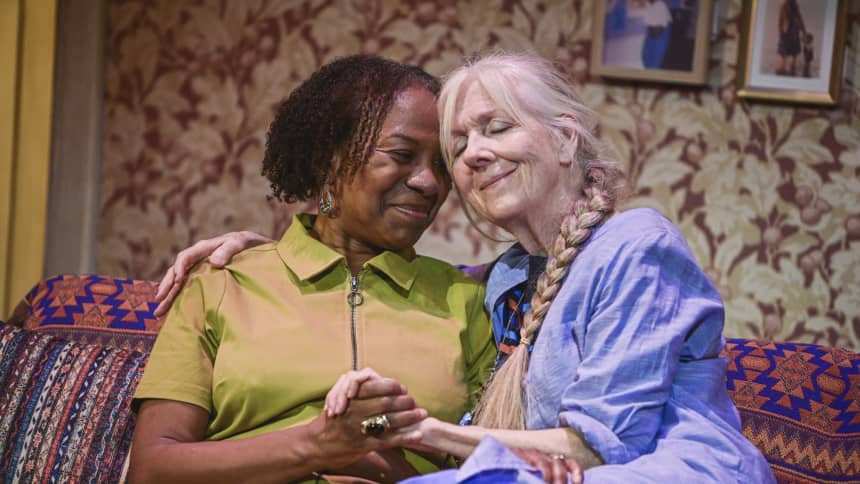Kaja Brown reviews Es and Flo, a production from the Wales Millennium Centre which will soon transfer to the Kiln Theatre in London
Es and Flo is a new production from the Wales Millennium Centre about an older lesbian couple fighting to be together against all odds.
The titular couple have secretly been in a relationship since the 80s, however now that Es’s memory is fading and she is struggling to take care of herself, her son, Peter, is trying to take control of their life and separate the couple by moving his mother into a care home. The events that ensue explore the moments in their history that have led up to this point and whether their relationship can survive this ordeal.
Although Es and Flo are the heart of the play, other characters are tenderly given their time in the limelight. At first Flo is upset when Peter arranges for a carer, Beata, to come in behind her back, however this carer and her daughter Kasia quickly become part of the family and their own lives unfold as the play goes on.
Es and Flo does a lot all at once: it is an intersectional performance about an elderly interracial lesbian couple, looking at the feminist movement, Welsh living, domestic violence, found family and more.
This performance is a heartfelt tale of love, found family and female empowerment. It has intersectional themes running through it as well as activist undercurrents. Es and Flo meet at Greenham Common in the 80s. Although they are a fictional couple, Greenham Common was very real. The Greenham Common Women’s Peace March was a movement against the use of nuclear weapons at the RAF Greenham Common in Berkshire. The protests were started by Welsh women in September 1981 as 36 women from ‘Women for Life on Earth’ marched against the British government’s decision to allow cruise missiles to be stored on site. This ignited a huge movement and within a year there were over 30,000 women onsite, with many camping out there and even infiltrating the perimeters to demonstrate. This was a huge feminist movement as many of the women there felt they were directly opposing the patriarchy by being active in this important political discussion and using their status as mothers to plead for the lives of their children who may be affected by nuclear warfare. The protesters were often looked at unfavourably by the media and other groups that tried to discredit them and challenged their positions as mothers since they were not at home looking after their children. In the play, it is revealed that Es lost custody of her own son due to her involvement in Greenham and the guilt follows her through the production.
Syniadau uchelgeisiol, awdurdodol a mentrus.
Ymunwch â ni i gyfrannu at wneud Cymru gwell.
I would have liked the play to say more about Greenham, but I enjoyed what it did say about it. As Es is an ex-teacher and principal she takes it upon herself to teach Beata’s daughter Kasia about what happened at Greenham, and the girl quickly becomes a vocal feminist, yelling out chants from the 80s and making signs and even a make-shift camp at home. This sharing of knowledge is very sweet, especially as Es loses her memories, and echoes the lost knowledge of younger generations today, who may not know about Greenham Commons.
I will give a trigger warning that the performance does deal with issues of domestic violence, death and dementia. I was sobbing through the whole second half so you might want to bring some tissues. The performance received an overwhelmingly positive reaction and the cast received a standing ovation afterwards. The cast then came on stage to tell us that a crew member had passed away a few days before, and so they were dedicating this performance to them. I was impressed by both their ability to perform under the circumstances and their kind gesture of dedicating Es and Flo to their friend and co-worker.
Es and Flo does a lot all at once: it is an intersectional performance about an elderly interracial lesbian couple, looking at the feminist movement, Welsh living, domestic violence, found family and more. If you are looking for a play that will tug on your heart strings and bring you a sense of feminine togetherness then this is the performance for you.
All articles published on the welsh agenda are subject to IWA’s disclaimer. If you want to support our work tackling Wales’ key challenges, consider becoming a member.




